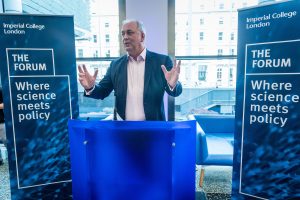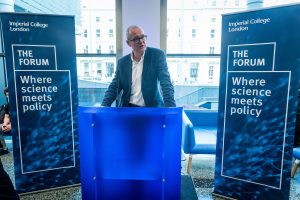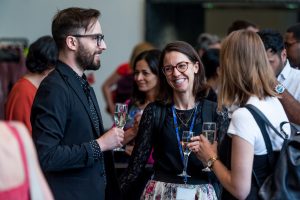On Wednesday 10 July Government Chief Scientific Adviser Sir Patrick Vallance joined Professor Nick Jennings at an event to formally launch The Forum – Imperial’s programme to connect researchers with policy makers. The remarks they gave in launching The Forum and on the importance of scientists and policy makers working together are below.
Prior to the launch Sir Patrick was hosted by Professor Mary Ryan, Vice-Dean (Research) of the Faculty of Engineering for an audience Q&A. You can listen to that here.

Professor Nick Jennings, Vice–Provost (Research and Enterprise)
Imperial has a fantastic of record of creating impact through spin outs and companies, but actually we have something to say around policy. I spent six years as the government’s Chief Scientific Adviser for National Security, so working in that CSA network, and it was a fantastic experience. I really enjoyed it. However, one of the things that I was surprised at was that I found relatively few people from Imperial that I would speak to and come across at meetings. I would see other universities, and universities that I do not think are perhaps as strong as Imperial very much present in those meetings. One of the things I really wanted to do was to make sure that Imperial was able to take the talents and the excellence of the research that we do and to really impact. In fact, I even pitched this as part of my job interview three years ago. It has taken me a bit of time, but I am delighted to launch The Forum.
The Forum
We have been running it for just over a year now, not quite in stealth mode but without a big launch, and it really is very effective. We bring together a group of senior civil servants, we take a particular topic and we discuss it with a group of our academics. In your tote bags, which I see lots of you are carrying, you will see some examples of some of the areas and topics that we have done thus far. We have tackled issues from artificial intelligence to vaccines, and those have both been written up as long reports. It really is something that I think is really valuable and really important that we do as a college.
The Forum is our means of doing that. An important point to say is that we do it in concert with government departments. A couple of events and sessions that we have had had been suggested by groups of government departments, so if you are in a government department and you are thinking, “Would it not be great if we had a Forum session on that?” Then we have a way of doing that, which is through Government Office for Science, and they will collate together those issues. We really do want to be responsive. Wherever the initial thought comes from, we really work together to co-create it. We really want to see what the attendees are interested in hearing about. It is not just at the headline level but actually what details they would like to find out more about. I think it is a great means of getting greater science understanding and information into policy.
It gives me real pleasure to officially open it tonight, with Patrick as our guest, who is also going to say a few words about that. Thank you very much.

Sir Patrick Vallance, Government Chief Scientific Adviser
I should probably declare an interest that I am a UCL person, but I do hold an honorary degree from here and I am an honorary fellow, so it is great to be here. You have already had me for an hour talking, so I will only speak for 45 minutes or so now and let you get back to your drinks.
Science advice in government
When I took on this job, the previous holder, Mark Walport, who, of course, was from Imperial, said to me, ‘It is a very interesting job’. I do not think he meant it to be quite as interesting as it is at the moment in terms of politics, but it certainly is an interesting time to be doing it. What is absolutely clear is that science is central to the big societal and governmental challenges that we face. I can think of virtually no problem that comes through government that does not have some science and technology angle. There is no way that, as Government Chief Scientific Adviser, I can be the person who gives all the science advice. There is no way that the network of Chief Scientific Advisers can be the only way that we give advice into government. There is no way even the 10,000 or so people in the Government Science and Engineering Profession can be the only source of advice, and that should not be the case.
This idea that we need to get the science system in government right is important. One can compare, for example, what is happening in some other countries where science and engineering’s completely embedded in the system. The obvious is in China, where we see many people with science and engineering degrees in the government, whether that is in the civil service or the in the political side. Before I took this job, I spoke to a pervious Cabinet Secretary and he said to me, ‘Science advice across government has been a bit sporadic. Sometimes it is great. Sometimes it is really important, in emergencies and so on, but it is not always great. It is not embedded. It is not absolutely part of the system in the way that, for example, the economists have become’. He said, ‘That was not always the case with economists. Economists were not always embedded in the system’. His advice was, ‘Why do you not try to make the science as instrumental and embedded as the economists are’. I think that is an aim which we need to go after to do that. That means that the science system inside government needs to be right, whether that is the Chief Scientific Advisers, whether it is the other scientists across government, whether it is the ability for people who make policy to be good customers of science, understand science and understand that science is a method, an approach and not the body of facts that constitute scientific knowledge but the way in which we approach problems and that it is problem solving.
It is also, and fundamentally, about the links to the external world and making sure that we can tap into the great expertise, the deep expertise and the experience that we have across science in the UK, whether that is in universities or whether it is in industry. That is a really key part to get right. That is why, in my view, this initiative, this Forum is so important.
Making connections
It is almost impossible to navigate government and to understand where things happen. It is almost impossible to navigate a university and find out where people are, what they are doing and who knows what.
I was an academic for long enough to know that you often found out that the person in the next corridor is working on the same thing that you’re working on, or something relevant or that you’re interested in and you found out because you bumped into them at the airport. Not because you met them in the university.
And so this notion of bringing together people in a way that we have networks that bring together not only policy makers, people from government and university but actually help to navigate both sides by bringing the university together is critically important. And it’s important for policy, and it’s important for emergencies.
I really welcome the fact that this has been set up. I think it’s going to make life very much easier in terms of interaction, but it’s also going to increase the level at which the interaction can take place and also the durability. And the other thing that you all know is that relationships are important in this. Whatever we think about the data revolution, there’s something quite important about personal contacts. Being able to pick the phone up and talk to people or come and see people, so the networking of this is important.
What do we need? We need experts for sure – experts underpin all of this and expertise often sits in academia and expertise is something that is very strong here at Imperial. We need to be able to access that easily and The Forum I think is going to help with that. We need evidence synthesis. We need people who absolutely understand how to bring evidence together, rather than have sporadic, almost campaigning approaches to science. We need networks and this is a network that I think is going to be important, and these networks need to be maintained and durable. From that, something will emerge which is a greater understanding.
I’ve been in my role for just over a year and I’ve learned an enormous amount about how Whitehall* works. About how things get done across government, how things cannot be done, how people can stop things happening as they’re doing in all sorts of walks of life. That greater understanding of how the systems work is an important part of this and if we can, through this, get more people to understand about policy, some of whom may come into government, some of whom may stay in academia, some of whom will be able to give advice from time to time. That’s a really important part of this. So I welcome The Forum and I’m really pleased that this has happened.

Opportunities to engage
I want to give two pitches for roles that are up at the moment. One is with ESRC through UKRI – two positions for academics to come and work with Government Office for Science to work on Areas of Research Interest. The aim of that is to say, how can we turn these Areas of Research Interest into things that are really attractive and tractable to academic projects. So that rather than just have a series of policy wishes and a big gap between how do I think about doing that to try and bring that together – so those two posts have gone live today. And the other is that I co-chair something called the Council for Science and Technology which is the Prime Minister’s advisory group. An eclectic group of people from academia, business, finance and other areas which tackle big problems, like some of the ones we were talking about, and try to give succinct advice to the Prime Minister. That’s been running for many years and we are just in the process of looking for new members of that – 7 new members – so that’s something that people might like to look at.
I’ll finish and say, The Forum is going to be important. We’ve got policy units springing up all over the place in academia which is a good thing – but there is something about bringing that together in a manageable way, and I think The Forum does exactly that.
I’m delighted to be here at the opening of this and congratulate you Nick for the vision to do this and the team for putting this together. So thank you very much, and good luck.
* Whitehall is a colloquial word for the UK/English Civil Service.